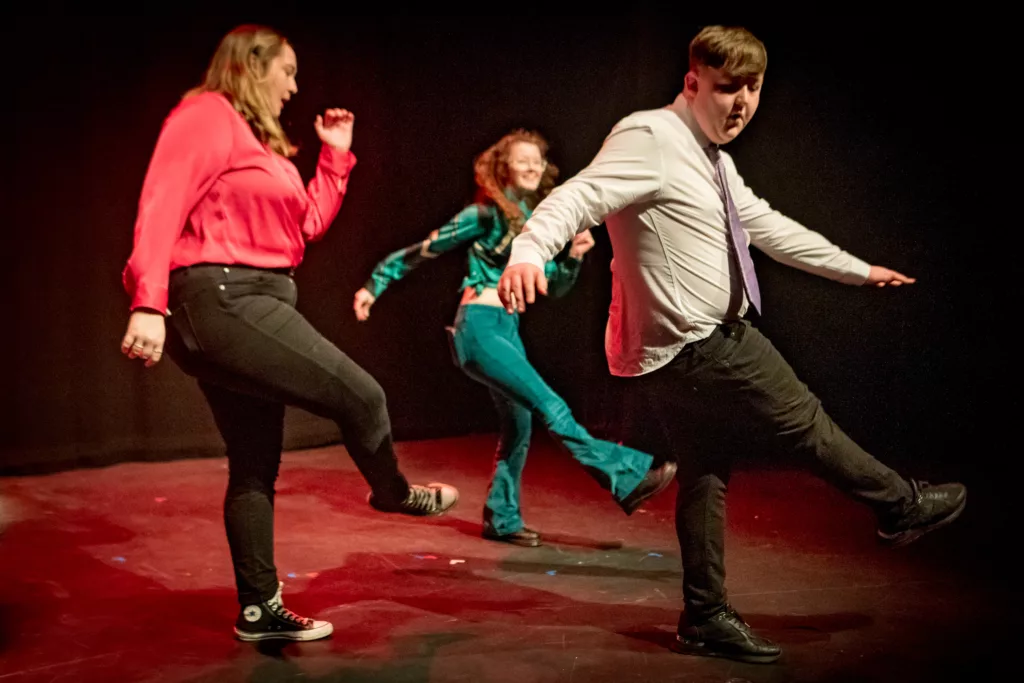Every few years, YTAS undertakes the Youth Theatre in Scotland Sector Review, which is a national survey that helps us identify how we’re developing as an overall youth theatre sector, and how we can develop further.
Findings from the research provide a snapshot of youth theatre provision in Scotland in 2023 and how it compares it to the sector in 2015 and 2020. Our findings help us to capture the big picture, and sharpen the focus of our work. Past respondents have used the research’s insights to identify their own priorities, invigorate funding applications, support communities, and develop opportunities for participants and leaders.
Key Findings
Scotland’s Youth Theatres
- The 2023 survey recorded data from 216 youth theatre venues across Scotland hosted by 87 organisations, with 1,265 staff and volunteers and 21,159 participants each year. Through our year-round sector support and development work, YTAS is aware of many more groups and leaders who didn’t complete the survey so can confidently estimate Scotland has over 300 youth theatres and 30,000 participants.
- A higher percentage of youth theatre organisations and venues are based in priority postcodes when assessed against the Scottish Index of Multiple Deprivation, with 70% of all groups operating in the top three quintiles.
- Most youth theatres organisations are set up as independent (52%) or voluntary (21%) organisations or affiliated to a theatre (20%). The 25% reduction in groups affiliated with a school, education body or local authority that we’ve recorded across previous Sector Reviews was sustained into 2023. We also recorded a notable increase in the number of youth theatres now with registered charitable status (up to 61% of groups).
Have a look at our map to see how youth theatre organisations and venues are spread across the country, based on those who provided complete postcodes. Please note, organisation addresses may also be venues for youth theatre activity, for example, if an organisation’s office address is also their studio space. Locations marked only as venues are additional spaces used by one or more of the organisations who completed the sector review, so we know youth theatre activity goes on in these buildings.
Participants
- Participant numbers appear to be rising again across Scotland following the impact of lockdown and a period of sector recovery. There was a significant increase in holiday and project participants, likely due to additional recovery funding and projects undertaken.
- Youth theatres continue to broaden the ages they work with. Whilst the vast majority engage school-aged participants (5-18), over half of youth theatres also now work with young adults (19-25yrs) and over a third now engage early years participants (0-4yrs) too.
Staff and Volunteers
- The number of paid youth theatre staff is increasing, most notably for those who’ve consistently engaged in our Sector Reviews since 2015. Volunteer numbers increased significantly in 2023 although we’re not sure of the cause of this at this stage.
- The number of organisations now paying their sessional staff for the additional time required for the role has nearly doubled, including for preparation (up to 74%) and travel (up to 29%).
- We now have a clear picture of sessional youth theatre staff rates of pay which can help inform future planning and aspirations for the sector’s workforce. We are keen to undertake further reviews of these rates with our members as well as comparisons across other arts and youth work sectors.
| Lowest | Average | Highest | |
|---|---|---|---|
| Hourly rate for leaders / facilitators | £10 | £28.99 | £60 |
| Sessional rate for leaders / facilitators | £20 | £94.04 | £275 |
| Daily rate for leaders / facilitators | £100 | £194.52 | £350 |
| Hourly rate for assistant roles | £8 | £14.88 | £30 |
| Sessional rate for assistant roles | £10 | £41.64 | £80 |
| Daily rate for assistant roles | £70 | £106.96 | £150 |
Activities
- The types of activities youth theatres undertake remained broadly similar across the last three Sector Reviews. Through a combination of weekly classes, rehearsals and performances most youth theatres in 2023 engaged in devising (78%), improvisation (72%) and scripted work (71%).
- Behind this consistent picture of activities is an evolving and notable multi-artform role many youth theatres play. With many groups engaging in musical theatre (46%), writing (45%), dance (37%), technical theatre (30%) and video/multimedia (24%).
- 60% of youth theatres also continue to offer regular or occasional online activities as part of their classes, rehearsals or international work.
Income, Fees and Financial Support
- Scotland’s youth theatres sustain their work and impact through range of income sources, underpinned by self-generated funds. Participation fees and box office income are the main source of funds for over half of Scotland’s youth theatres, and vital for many more. The fees organisations charge per session range from free (31%), between £1-£5 (30%), between £6-£10 (33%) or more than £10 (6%). The shift we’ve recorded over the years from groups charging below or above £5 per session appears consistent with inflation.
- As noted above, nearly a third of Scotland’s youth theatres provide their activities for free. In addition to this, we recorded a significant increase in the number of organisations now offering participants financial support (up to 71%). An average of 38% of participants have utilised this support where it was offered.
- The 2023 Sector Review recorded a significant increase in grant income for youth theatres from trusts and foundations, sponsorship / donations and, most notably, from Creative Scotland. This is likely connected to emergency and recovery funding appeals. At the same time there was a reduction in income from local authorities, youth theatre’s parent companies and from fundraising events held by groups.
Equalities, Diversity, and Inclusion (EDI)
- More youth theatres are now collecting and using EDI data around disability, gender, socio-economic disadvantage, race or ethnicity and sexual orientation, which they say is benefiting their participants, funders and organisational practices. Respondents also noted a range of improvements to their EDI terminology, practices and workload efficiencies.
- Respondents noted the main barriers to collecting and acting upon EDI data were lack of time (25%), not understanding how to collect the data (23%), not knowing how to make use of the data (21%) and concerns around ethics (20%). This feedback from respondents will continue to guide YTAS’s EDI sector support and development work.





Future Priorities and Concerns
The 2023 Sector Review provided space for youth theatres to share their priorities and concerns for the 12 months ahead. Below is a summary of the comments shared.
Priorities
- Expanding age groups, broadening participation, and increasing membership.
- Providing accessible arts experiences and growing diverse participation.
- Fostering confidence and creativity in participants and developing new areas, skills, and practice.
- Quality delivery and producing high-quality shows.
- Securing funding and financial stability.
- Addressing challenges caused by COVID-19 and concerns around their venue, participants’ wellbeing, staff training and environmental impact.
Main concerns
- Cost of living impacting class numbers and funding.
- Increased staff and energy costs coupled with the difficulty of securing core funding for staff and building.
- Flat funding has impacted sustainability, with increased financial challenges and hurdles to navigate.
- Maintaining accessibility amid rising costs.
- Staff and volunteer shortages and fatigue.
- Lack of support.



